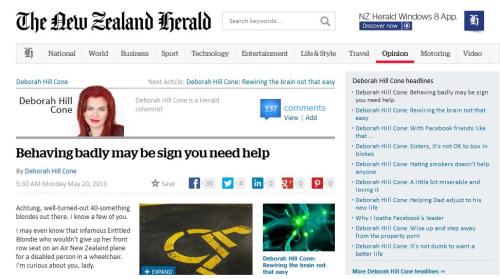To say that journalism is different now than what it was five years ago would be like saying the sky is blue — too obvious and too general to make any sense. Many will argue and rightly so, that the basics of journalism remain the same. What has changed however, is the way news is presented and consumed. Also, what has changed is what consumers expect of news organisations.
I am an online journalist and also a news consumer. I have come to almost instinctively expect certain things out of online versions of newspapers and I find it incomprehensible when some leading national newspapers just don’t seem to get it.
What has got my feathers in a ruffle today is the online version of The New Zealand Herald.
I confess that I no longer buy any print newspapers but yesterday I happened upon a print copy of the NZ Herald that just a week ago won the NZ newspaper of the year award.
While reading through an opinion piece by Deborah Hill Cone I realised I had quite forgotten the details of one of the stories she was discussing in her article.
So I logged on and went to the article on the Herald website expecting to find a link in the text to the original story in the online version.
While I was waiting for the article to load I couldn’t help but ponder over the amazing possibilities of online journalism.
Online journalism has at its disposal the power of the World Wide Web and hyperlinks are one of the many unique tools of the trade. They allow writers to source information, explain detail and provide depth in ways unique to the medium.
Unfortunately, the New Zealand Herald hasn’t yet woken up to the immense potential of online versions.
There was no link in the entire article that could direct me to the story that Deborah Hill Cone was talking about. There was also nothing to point me in the right direction in the related tags or in the related stories.
But related stories are usually computer generated and therefore not very accurate.
The Herald had simply put up their print version on their website.
The Guardian in the UK according to me has the best online version of all newspapers. So, to illustrate where the Herald failed, I went on to the Guardian website and onto Marina Hyde’s latest article.
Marina Hyde is a Guardian columnist just like Deborah Hill Cone is a New Zealand Herald columnist.
Hyde writes about Google in her latest article. She has 7 internal and external links in the article so that if you don’t know anything about the topic, it is only a click away.
Now that makes for good online journalism. The internal links generate more visitors to the website and to a story that they probably missed but were obviously interested in. The external links show that what you are talking about is actually based on something concrete.
It also shows you are confident enough to connect to another source and not scared of losing your precious unique visitor.
It’s also an attitude thing. The New Zealand Herald’s ‘no links’ policy — I am going to assume it is a policy because it seems consistent and not a one-time thing — shows them in bad light.
It seems to suggest that you ought to read and remember everything they write.
The Guardian on the other hand comes off looking like a sympathetic, understanding friend who knows you have other things to do in life.
Journalism is no longer limited by geography. A person can simply switch from one website to another for their daily news feed.
It’s little things like this that dictate the success of your online product and in not too distant a future the entire organisation.
Evolve or die is very true for news organisations at the moment. And you can’t just be lazy and ‘somewhat’ evolve.
The online version is pointless if all you do is dump your print copy onto the servers.


